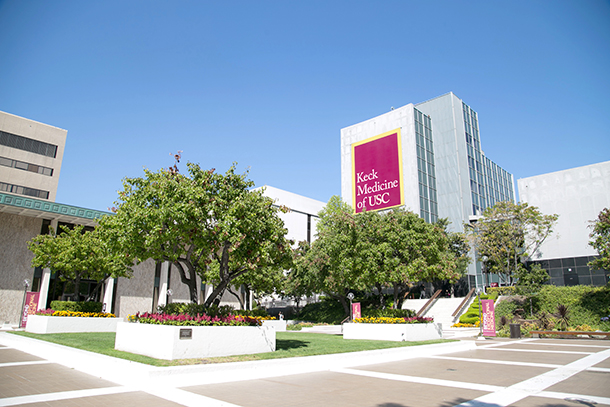“Tissue,” said Donna Elliott, MD, EdD, senior associate dean for student and educational affairs at the Keck School of Medicine of USC, “is my number one office product.”
Elliott’s charge is to support students on their four-year journey. The shorthand is to “promote wellness.” In practice, she said, members of the medical faculty are witness to both joy and pain.
“How does that proverb go? ‘Physician, heal thyself,’” she said. “We attend to one’s foibles before dealing with the defects of others. But how formidable a task that can be, especially for a third- or fourth-year medical student.”
Tragedy touched Keck School’s program with the suicide of a medical student a year ago, adding urgency to a conversation about emotional well-being the school had initiated some years earlier.
The Keck School is decidedly is not alone. A study published in the December issue of JAMA found a high rate of depression and suicidal ideation among medical students. Medical educators have long known that stress rides along on this four-year journey, too often silently and in the shadows.
“This much is crystal clear,” she said. “The pursuit of mental health in medical school must be normalized. We can do no less if we expect to decrease the stigma and begin to move the culture ever so slightly toward empathy and away from judgment.” That, she said, is why the Keck School designates March as Mental Health Awareness Month.
According to Elliott, the Keck School has begun to turn recent learnings and insights into actions. Her team now includes Chantal Young, PhD, a part-time director of medical student wellness, a clinical psychologist working on the front line with students, and Tobi Fishel, PhD, a part-time GME director of wellness, for residents.
“We’re taking steps large and small,” Elliott said. “Everything from faculty members regularly breaking bread with students, discussing bumps in the road with candor and compassion, to enlisting an array of professionals and programs: dietitians, occupational therapists, spiritual wellness counselors, academic support services, diversity officers and more. Peers, likewise, are critical.”
Keck Peer Support (KPS) is a confidential, student-run group that provides assistance to fellow medical students.
The Keck School is innovating along the way, she explained. For first-year students, mental health screenings – consisting of 15-20 minute interviews, dubbed “KeckChecks” — are mandatory across the board, so no one feels singled out. Keck School has incorporated “wellness days” into clerkship schedules, to provide students with an opportunity to attend to their personal well-being.
The school pays special attention to third-year students, who rotate in seven tracks. A hand-selected faculty member follows each of those tracks and meets once every six weeks with his or her track. Some students have reported that they don’t know how they would have made it without that support, Elliott noted.
On the schedule this academic year: periodic surveys of depression, burnout, and/or anxiety; and bystander training for students, with the accent equally on response and prevention.
“This is just the beginning,” she said. “We’re also looking at scheduling study breaks involving yoga, walks and mindfulness activities; dedicating sessions to dealing with grief and loss in the curriculum — and, yes, doing what we can to eradicate the perception that perfection is expected at all times from all students.
“Wellness is clearly on our agenda,” Elliott affirmed. ”It is now central to the medical school experience at USC. As educators and clinical professionals, we fervently believe that an ongoing, honest conversation on wellness — and its inverse — is long overdue.
“It is time for us to heal each other.”


